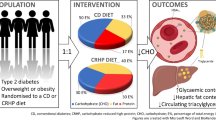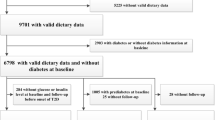Abstract
Background
High protein intake leads to a decline in renal function in the advanced stages of chronic kidney disease (CKD). An effective diet for maintaining renal function in healthy individuals or patients in the early stages of CKD has not been established. This cohort study was conducted in Saku, Nagano Prefecture, Japan, to investigate the impact of dietary habits on renal function.
Methods
In this cross-sectional cohort study, we used the Saku Control Obesity Program (UMIN000016892), including 4,446 participants who submitted a brief-type self-administered diet history questionnaire and underwent routine physical examination. The amount of food intake was divided into quartiles. After adjusting for age and sex, multivariate logistic regression analysis was used to calculate the odds ratio (OR) for the risk of developing CKD (estimated glomerular filtration rate [eGFR] < 60 mL/min/1.73 m2).
Results
In total, 3,899 participants were analyzed. The overall prevalence of patients with eGFR < 60 mL/min/1.73 m2 was 11% (n = 434, male; 7.1%, female; 4.1%). The groups with a high intake of chicken (approximately 63.4 g/day, adjusted OR: 0.632, P = 0.003), natto (fermented bean; approximately 21.7 g/day, adjusted OR: 0.679, P = 0.01), and plant protein (approximately 0.8 g/ideal body weight/day, adjusted OR: 0.695, P = 0.042) showed a low risk of developing CKD compared to the group with the lowest intake.
Conclusions
Our cross-sectional study showed that the intake of chicken meat, natto, and plant protein was associated with high eGFR levels. This information can be of value for preventing CKD incidence in healthy Japanese individuals.
Similar content being viewed by others
Data availability
The data are available from the corresponding author upon reasonable request.
References
Chan AY, Cheng ML, Keil LC, Myers BD. Functional response of healthy and diseased glomeruli to a large, protein-rich meal. J Clin Invest. 1988;81:245–54.
Addis T. Glomerular nephritis: diagnosis and treatment. NY: MacMillan; 1948.
Brenner BM, Meyer TW, Hostetter TH. Dietary protein intake and the progressive nature of kidney disease: the role of hemodynamically mediated glomerular injury in the pathogenesis of progressive glomerular sclerosis in aging, renal ablation, and intrinsic renal disease. N Engl J Med. 1982;307:652–9.
Eckardt KU, Kasiske BL. Foreword. Kidney Int. 2009;76113:S1–2.
Rughooputh MS, Zeng R, Yao Y. Protein diet restriction slows chronic kidney disease progression in non-diabetic and in type 1 diabetic patients, but not in type 2 diabetic patients: a meta-analysis of randomized controlled trials using glomerular filtration rate as a surrogate. PLoS ONE. 2015;10: e0145505.
Watanabe S, Tsugane S, Sobue T, Konishi M, Baba S. Study design and organization of the JPHC study. J Epidemiol. 2001;11(6sup):3–7. https://doi.org/10.2188/jea.11.6sup_3.
Sasaki S, Yanagibori R, Amano K. Self-administered diet history questionnaire developed for health education: a relative validation of the test-version by comparison with 3-day diet record in women. J Epidemiol. 1998;8:203–15.
Scheer FA, Hilton MF, Mantzoros CS, Shea SA. Adverse metabolic and cardiovascular consequences of circadian misalignment. Proc Natl Acad Sci USA. 2009;106:4453–8.
Imai S, Fukui M, Kajiyama S. Effect of eating vegetables before carbohydrates on glucose excursions in patients with type 2 diabetes. J Clin Biochem Nutr. 2014;54:7–11.
Estruch R, Ros E, Salas-Salvadó J, et al. Primary prevention of cardiovascular disease with a Mediterranean diet supplemented with extra-virgin olive oil or nuts. N Engl J Med. 2018;378: e34.
Yamori Y, Miura A, Taira K. Implications from and for food cultures for cardiovascular diseases: Japanese food, particularly Okinawan diets. Asia Pac J Clin Nutr. 2001;10:144–5.
Chiavaroli L, Viguiliouk E, Nishi SK, et al. DASH dietary pattern and cardiometabolic outcomes: an umbrella review of systematic reviews and meta-analyses. Nutrients. 2019;11:338.
Matsuo S, Imai E, Horio M, et al. Revised equations for estimated GFR from serum creatinine in Japan. Am J Kidney Dis. 2009;53:982–92.
Kobayashi S, Murakami K, Sasaki S, et al. Comparison of relative validity of food group intakes estimated by comprehensive and brief-type self-administered diet history questionnaires against 16 d dietary records in Japanese adults. Public Health Nutr. 2011;14:1200–11.
Kobayashi S, Honda S, Murakami K, et al. Both comprehensive and brief self-administered diet history questionnaires satisfactorily rank nutrient intakes in Japanese adults. J Epidemiol. 2012;22:151–9.
Murakami K, Sasaki S, Takahashi Y, et al. Reproducibility and relative validity of dietary glycaemic index and load assessed with a self-administered diet-history questionnaire in Japanese adults. Br J Nutr. 2008;99:639–48.
Willett WC, Howe GR, Kushi LH. Adjustment for total energy intake in epidemiologic studies. Am J Clin Nutr. 1997;65(4):1220S-1228S. https://doi.org/10.1093/ajcn/65.4.1220S.
Motokawa M, Fukuda M, Muramatsu W, et al. Regional differences in end-stage renal disease and amount of protein intake in Japan. J Ren Nutr. 2007;17:118–25.
Haring B, Selvin E, Liang M, et al. Dietary protein sources and risk for incident chronic kidney disease: results from the Atherosclerosis Risk in Communities (ARIC) study. J Ren Nutr. 2017;27:233–42.
Lew QJ, Jafar TH, Koh HW, et al. Red meat intake and risk of ESRD. J Am Soc Nephrol. 2017;28:304–12.
Willett WC, Sacks F, Trichopoulou A, et al. Mediterranean diet pyramid: a cultural model for healthy eating. Am J Clin Nutr. 1995;61(Supplement):1402S-S1406.
Santin F, Canella D, Borges C, Lindholm B, Avesani C. Dietary patterns of patients with chronic kidney disease: the influence of treatment modality. Nutrients. 2019;11(8):1920. https://doi.org/10.3390/nu11081920.
Jing Z, Wei-Jie Y. Effects of soy protein containing isoflavones in patients with chronic kidney disease: a systematic review and meta-analysis. Clin Nutr. 2016;35:117–24.
Lin YC, Chen EH, Chen RP, Dunny GM, Hu WS, Lee KT. Probiotic bacillus affects Enterococcus faecalis antibiotic resistance transfer by interfering with pheromone signaling cascades. Appl Environ Microbiol. 2021;87: e0044221.
Piewngam P, Zheng Y, Nguyen TH, et al. Pathogen elimination by probiotic bacillus via signalling interference. Nature. 2018;562:532–7.
Fujiwara K, Miyaguchi Y, Toyoda A, et al. Effect of fermented soybean “Natto” supplement on egg production and qualities. Asian-Australas J Anim Sci. 2008;21:1610–5.
Gupta J, Mitra N, Kanetsky PA, et al. Association between albuminuria, kidney function, and inflammatory biomarker profile in CKD in CRIC. Clin J Am Soc Nephrol. 2012;7:1938–46.
Anders HJ, Andersen K, Stecher B. The intestinal microbiota, a leaky gut, and abnormal immunity in kidney disease. Kidney Int. 2013;83:1010–6.
Shi K, Wang F, Jiang H, et al. Gut bacterial translocation may aggravate microinflammation in hemodialysis patients. Dig Dis Sci. 2014;59:2109–17.
Natarajan R, Pechenyak B, Vyas U, et al. Randomized controlled trial of strain-specific probiotic formulation (Renadyl) in dialysis patients. BioMed Res Int. 2014;2014: 568571.
He LX, Abdolmaleky HM, Yin S, Wang Y, Zhou JR. Dietary fermented soy extract and oligo-lactic acid alleviate chronic kidney disease in mice via inhibition of inflammation and modulation of gut microbiota. Nutrients. 2020;12:2376.
Horie M, Koike T, Sugino S, Umeno A, Yoshida Y. Evaluation of probiotic and prebiotic-like effects of Bacillus subtilis BN on growth of lactobacilli. J Gen Appl Microbiol. 2018;64:26–33.
Acknowledgements
The authors thank all the participants for their dedication to this research project. We sincerely thank all researchers and co-medical staff of Saku Central Hospital for their excellent medical examinations and follow-up surveys. There is no conflict of interest in all the authors listed.
Funding
This study was partly supported by a fund from a Research-in-Aid Grant for Cardiovascular Diseases from the Ministry of Health, Labor and Welfare.
Author information
Authors and Affiliations
Contributions
Shaw Watanabe and Shu Wakino conceived the idea of the study. The authors wish to acknowledge AM, MI, and MY for valuable technical assistance. KA developed the statistical analysis plan and conducted the statistical analyses. HI contributed to the interpretation of the results. KA drafted the original manuscript. TK supervised the conduct of this study. All authors reviewed the manuscript draft and revised it critically on intellectual content. All authors approved the final version of the manuscript to be published.
Corresponding author
Ethics declarations
Conflict of interest
The authors have declared that no conflict of interest exists.
Ethical approval
The study protocol was reviewed and approved by the ethics committee of Saku Central Hospital and adhered to the principles of the Declaration of Helsinki. Informed consent was obtained from all individual participants included in the study.
Additional information
Publisher's Note
Springer Nature remains neutral with regard to jurisdictional claims in published maps and institutional affiliations.
Supplementary Information
Below is the link to the electronic supplementary material.
About this article
Cite this article
Adachi, K., Yasuda, M., Ida, M. et al. Impact of dietary habits on renal function in Saku, a rural Japanese town: a cohort study. Clin Exp Nephrol (2024). https://doi.org/10.1007/s10157-024-02479-6
Received:
Accepted:
Published:
DOI: https://doi.org/10.1007/s10157-024-02479-6




